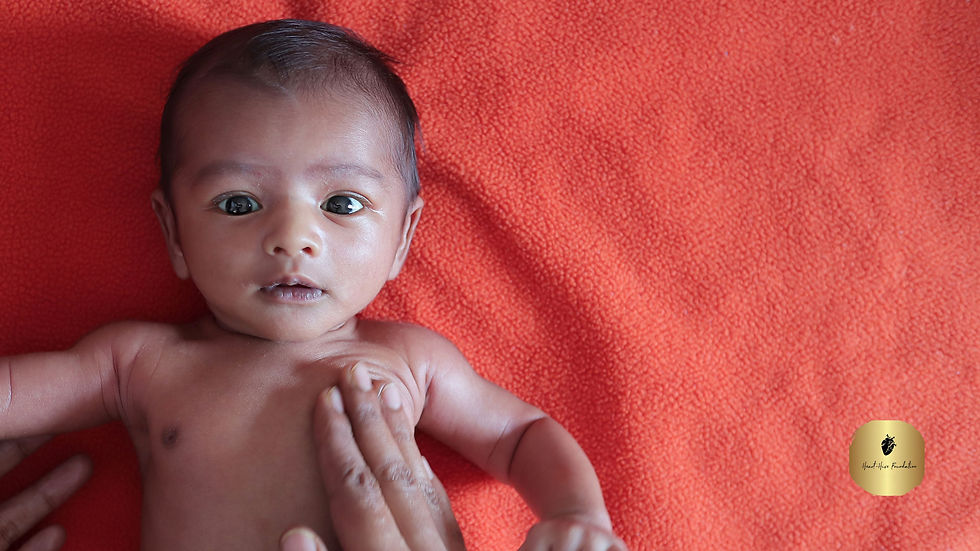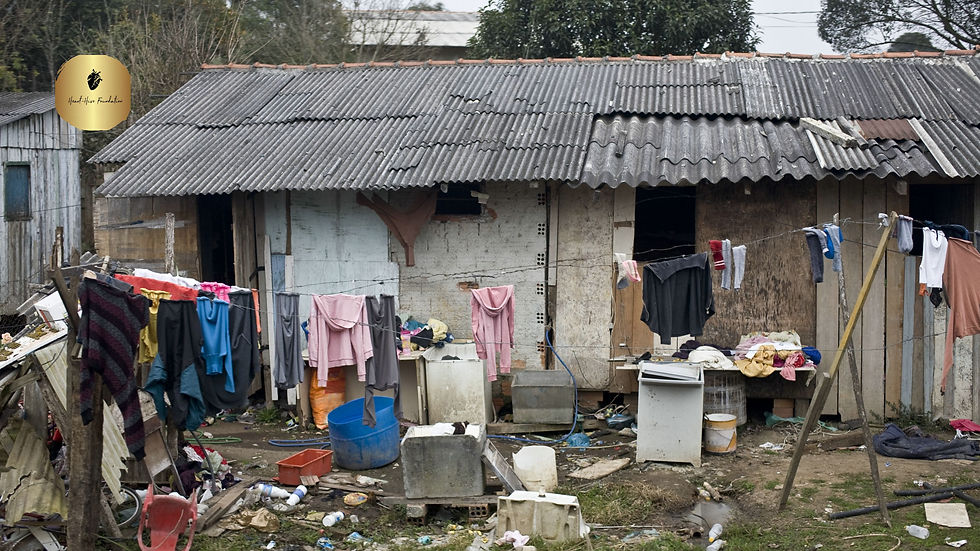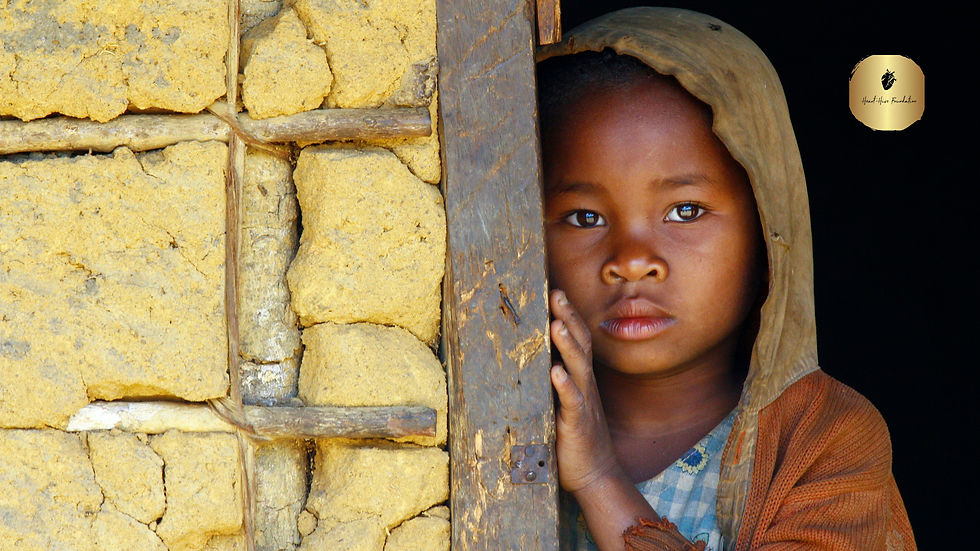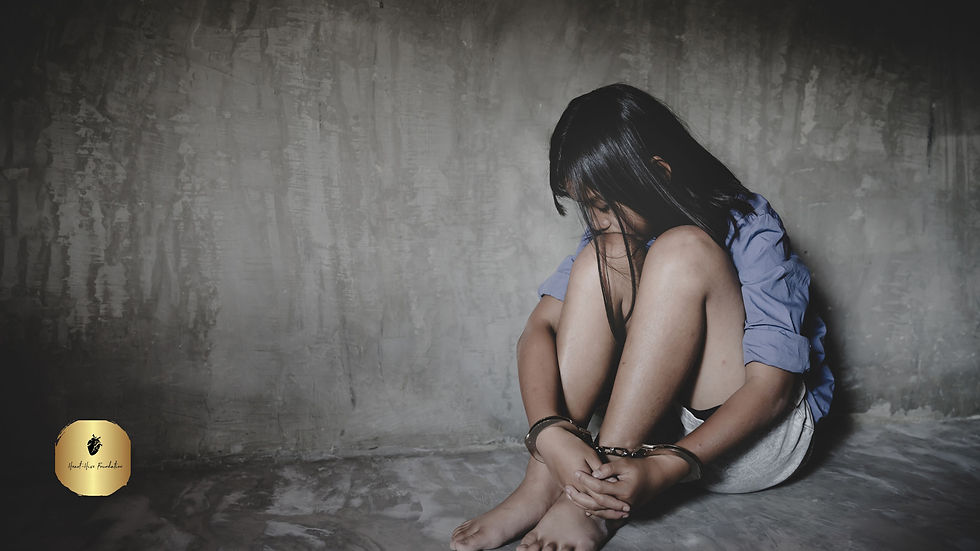15 Hidden Struggles Faced by Children in Poverty
- hearthiveorg

- Jul 28, 2025
- 5 min read
Updated: Aug 21, 2025
Every child enters the world with untapped potential, a spark waiting to ignite. But not every child gets the same chance to grow, learn, and dream. Some are born into comfort, while others face unimaginable challenges from the very beginning. When we pause to think about the stark contrast, it’s hard not to feel something stir within us—a mix of sorrow, outrage, and a deep sense of responsibility. Especially when it comes to children in poverty, the truth becomes undeniable: their future shouldn’t be determined by circumstances they never chose.
You might not see it yet, but we hold the power to rewrite the story. Our voices, our awareness, our empathy—it all matters. The moment we choose to look beyond our own world and into the eyes of those who are struggling, we begin to see just how much our perspective can shift. And from that shift comes aid and action.
Why Every Child Deserves a Chance
Why does every child deserve a chance? Because dreams are universal, but opportunities are not. Poverty should never define a child’s worth or limit their future. Deep down, we know the world becomes a better place when we lift each other up—especially those who are denied their right to survival.
This isn't about charity. It’s about justice, dignity, and creating a world where children in poverty are seen, heard, and given the tools to rise. The question is: are we ready to see what it really means to give every child a fair chance?
Understanding the Daily Struggles of Children in Poverty

Hunger affects more than a child’s stomach—it impacts their ability to learn, grow, and concentrate. Without nutritious food, children in poverty face weakened immune systems, stunted development, and long-term health challenges that follow them into adulthood. This makes it harder to escape the very cycle of poverty they were born into.

Children in poverty often lack access to doctors, medicine, or even basic checkups. Preventable illnesses go untreated, and chronic conditions worsen. Without vaccinations, screenings, or emergency care, their health deteriorates. This healthcare gap leaves them vulnerable and reinforces disparities that affect every aspect of their development and well-being.

Many children in poverty live in unsafe, overcrowded environments. They are exposed to mold, toxins, violence, and poor sanitation. These conditions can cause illness, injuries, and psychological stress. Without stable housing, their daily lives are unpredictable and unsafe, stripping them of the security every child needs to grow and thrive.

Impoverished children may attend underfunded schools with outdated materials and overcrowded classrooms. They may lack internet, school supplies, or quiet places to study. Without quality education, they fall behind academically. This limits their future job prospects and perpetuates a cycle of poverty that education could otherwise help break.

The constant stress of poverty can take a toll on a child’s mental health. Anxiety, depression, and feelings of helplessness are common, yet often untreated. The emotional weight of instability, hunger, or unsafe surroundings deeply affects how children cope, learn, and interact with others throughout their lives.
Children in poverty may struggle to build confidence or form healthy relationships due to instability, stress, or neglect. Lacking consistent emotional support or positive role models, they can develop low self-esteem and poor social skills. This affects how they relate to others and how they see themselves.

Many impoverished communities experience high rates of crime, domestic violence, and community unrest. Children exposed to these environments may suffer trauma, fear, or even normalize violent behavior. Constant exposure to danger affects their brain development, emotional regulation, and overall sense of safety in the world around them.

Play is vital to childhood, but children in poverty often lack safe parks, toys, or structured recreational activities. Without opportunities for physical movement and creative exploration, their cognitive, social, and emotional growth is stunted. Play isn’t a luxury—it’s a developmental need that poverty too often denies.

Children from low-income backgrounds may feel excluded or judged by peers, teachers, or even neighbors. This stigma can lead to shame, withdrawal, and difficulty building friendships. Feeling “less than” chips away at their self-worth and sense of belonging, leaving emotional wounds that are hard to heal. Heart Hive Foundation works to restore that sense of dignity and inclusion by creating spaces where every child feels seen, supported, and valued.

Without access to proper nutrition, healthcare, stimulation, or safe environments, children in poverty often experience delays in motor skills, language, and emotional regulation. These delays hinder academic progress and social adjustment, increasing the likelihood of long-term learning difficulties and reduced life opportunities as they grow.

Poverty directly affects how a child’s brain develops. Inadequate nutrition, constant stress, and limited early learning experiences interfere with memory, focus, and problem-solving. These delays make it difficult to perform well in school and adapt to new challenges, placing them at a long-term disadvantage.
Chronic stress, instability, and trauma increase the risk of depression, anxiety, and behavioral disorders among children in poverty. Mental health services are often unavailable or unaffordable. These untreated issues impact school performance, relationships, and self-esteem—sometimes persisting into adulthood if left unaddressed during crucial developmental years.
Poverty-related challenges—such as hunger, unstable housing, and lack of school supplies—make learning difficult. Children may miss school often, struggle to concentrate, or fall behind. Without intervention, academic setbacks can compound over time, increasing the risk of dropping out and limiting future employment and income potential. It takes altruism and empathy to recognize these barriers and act to remove them, ensuring that every child has a fair chance at success.

Children in poverty are more likely to experience chronic illnesses like asthma, obesity, or infections due to poor living conditions and lack of care. Malnutrition and untreated medical conditions are common. Poor health limits school attendance, play, and socialization, reducing their chances of a healthy, thriving future.

When a child grows up without access to education, healthcare, or opportunity, they’re more likely to remain in poverty as adults. The cycle repeats across generations unless interrupted by real support and systemic change. Breaking intergenerational poverty requires long-term investment in each child’s rights, health, and development—something the Heart Hive Foundation is deeply committed to.
Ways to Amplify Your Voice for Change
Now that we’ve seen the struggles faced by children in poverty, the next step is ours to take. Let’s use our voices—not just to speak, but to advocate. We can share stories that matter. We can support organizations that provide essential aid. We can educate others about the injustices that strip children of their dignity, safety, and their fundamental right to survival. We don’t need a large audience to make a meaningful difference. We only need the will to act. Whether we volunteer, donate, speak out, or simply listen—every act of compassion helps shape a brighter future for a child in need.
Let’s stand up, speak out, and be the difference. The world doesn’t change all at once—but it does begin with people like us choosing to care, choosing to act, and choosing to amplify hope where silence once lived.
.png)



Comments